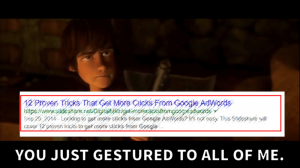
We’ve been noticing a trend recently.
A lot of our clients sell what we like to call “traditional” products–the kind of products that built America, we like to say. We’re talking manufactured goods, equipment, machinery–items that you can touch and feel and understand the purpose of by sight.
Some of our clients invented their product within the last decade, and some are part of a multi-generational business. But no matter their product, no matter their background, our clients all seem to have one commonality: their first inclination with marketing is NOT online. In fact, the digital sphere is usually the last frontier they traverse.
And we get it. Yes, online marketing is our bread and butter, and we’ll swear by the effectiveness of going digital til we’re blue, but we understand the hesitation.
See, a lot of our clients are all about interpersonal relationships. After all, their products are like that as well. They aren’t pushing some algorithm-based software that operates behind the scenes of someone’s workstation. Their products are designed to directly benefit the consumers or businesses that utilize them in a clear, unambiguous way. And such transparency requires building a relationship with your customer, showing them that you understand what problems they face, explaining how your product addresses it, and being available to answer any questions they might have immediately. Trade shows, sales calls–these are the obvious ways to foster that relationship, which is why they are embraced by so many of our clients. And for good reason–they’re incredibly effective. Digital marketing on the other hand? That seems cold and distant–no way to get the one-on-one connection our market thrives on. That’s better suited for the high-tech world.
Well, as we enjoy explaining to our clients–that’s not quite true.
You can build relationships with your customers through online marketing. In fact, you can build better relationships that way.
See, the core of the inbound marketing ideology is that it’s all about the consumer. And since our clients and their products are especially focused on customer relationships, we take particular care to ensure that any online marketing materials we produce for them are not cold, distant, or generic, but rather specifically address consumer pain points and issues. We research the web as if we were their target customers to better understand what those consumers are looking for, and to get a sense of the language they speak. In that way, blog content or premium offers are not just written for the World Wide Web at large, but for the people who we want to visit our site.
In other words, inbound marketing tells your customer that you are speaking directly to them through your content, building that strong foundation of trust you’re looking for while also growing your prospects and revenue. In-person communication is great, but it only offers limited time in which to engage your customers and convey that you understand them. Yes, it’s the most direct way to build a one-to-one connection, but the truth is there’s a ceiling to how far you can develop that relationship, say if your prospect has to hang up or walks to another booth. By utilizing the tools of targeted inbound marketing, you will strengthen your customer’s relationship not just with you as a company representative, but with your company as a brand.
Further, designated campaigns and landing pages allow you to gather more detailed, specific information than you’re usually able to at a large event. We’re not just talking contact details; this also includes what your customer is searching, at what point they’re engaging, what product from your line they’re specifically interested in, etc. Such information is invaluable in understanding how to turn a one-time buyer into a long-term customer, and in keeping consumers happy.
We will never discourage any client from making a sales call or visiting a trade show or expo. In fact, we frequently put the direct phone number of clients’ customer service reps on automated emails to facilitate sales calls, and have written numerous blog posts on how to optimize your time at trade shows. These face-to-face opportunities are great at initiating relationships with prospects and demonstrating your approachability.
But they are not the only, nor are they the best, ways to build those interpersonal relationships. Inbound marketing can take those connections and foster them into long-term clientele. Digital marketing doesn’t have to be a cold, automated system of pop-up ads. It can have thought and heart, helping customers find the information they’re looking for and ensuring engagement way past the initial interaction.
Digital & Social Articles on Business 2 Community(93)






